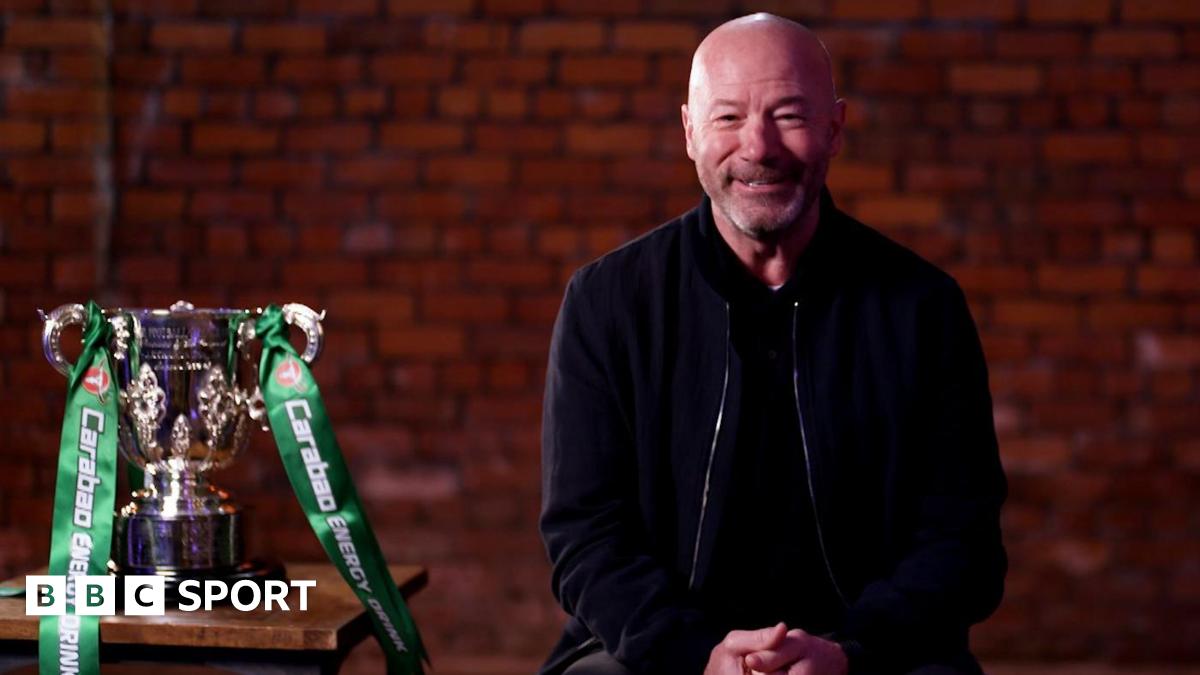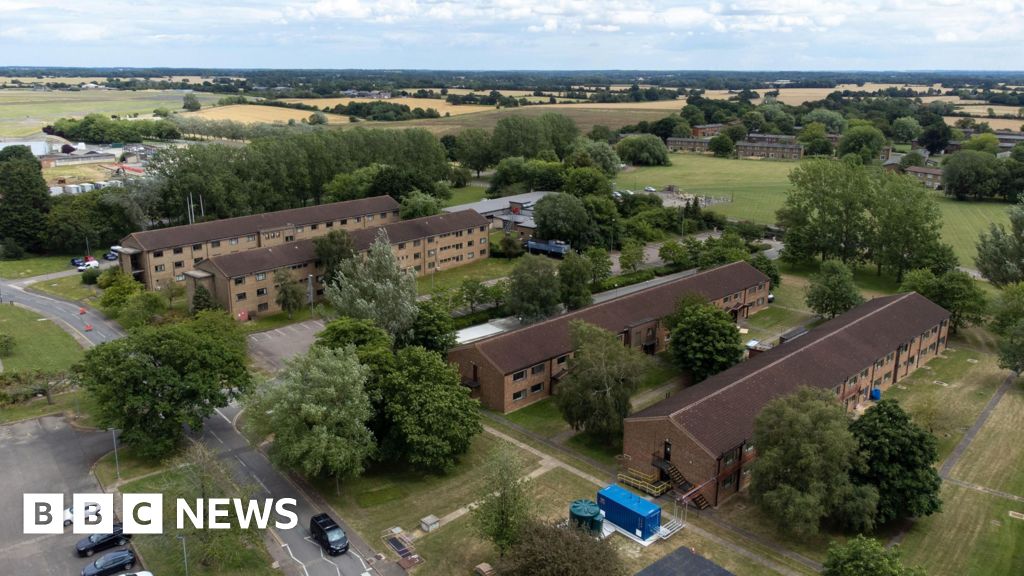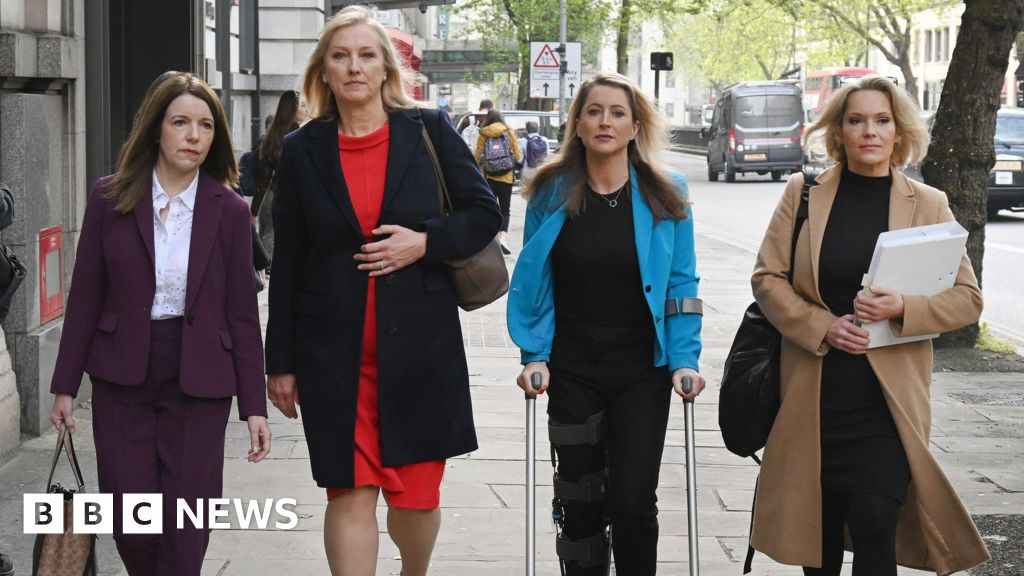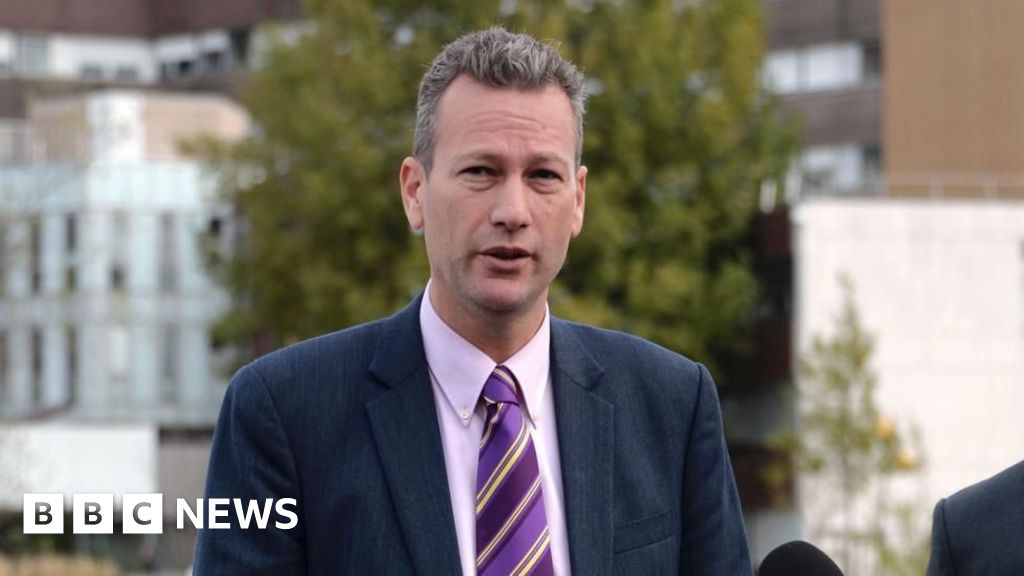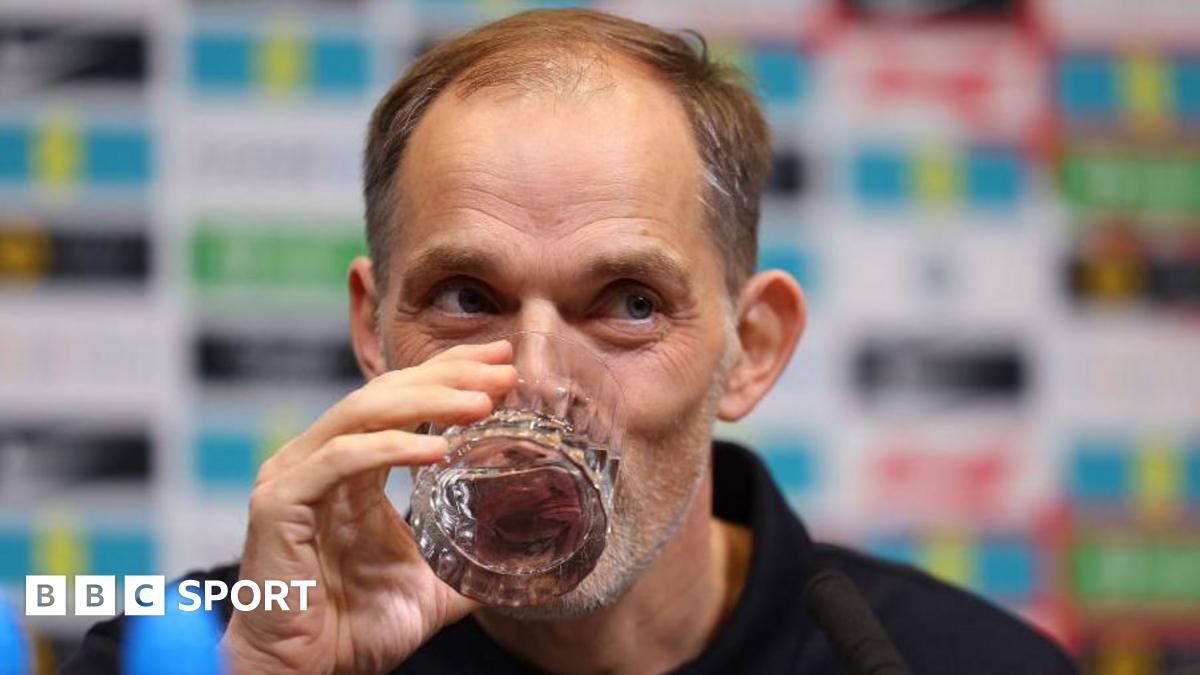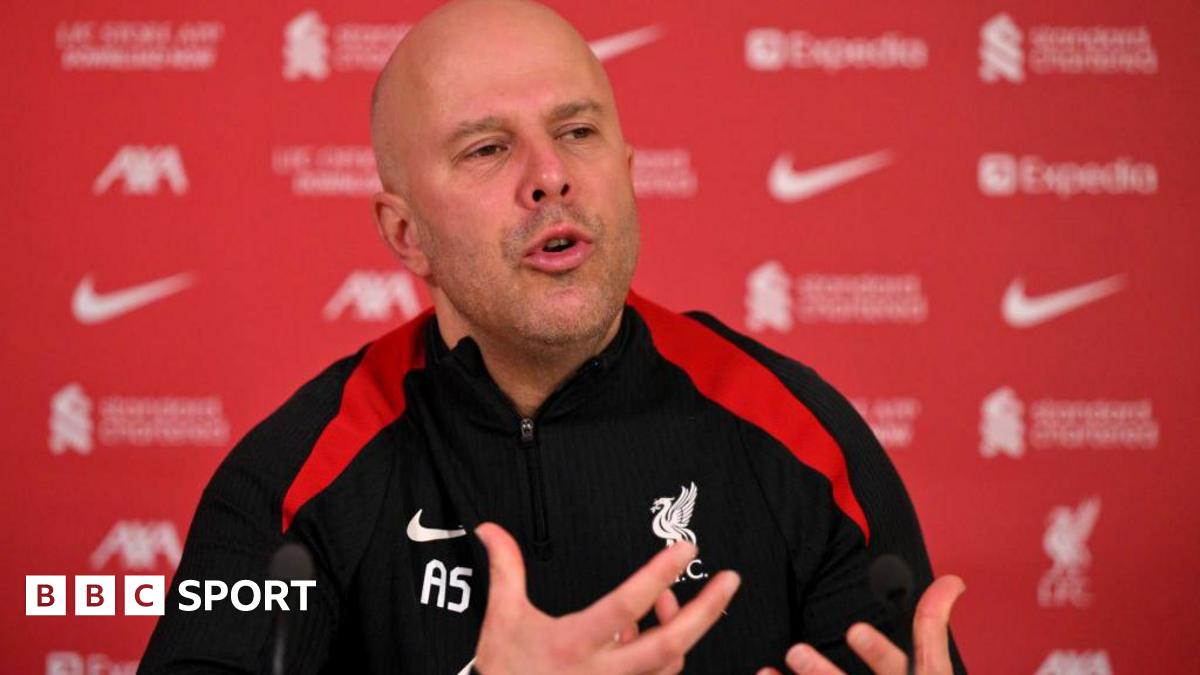
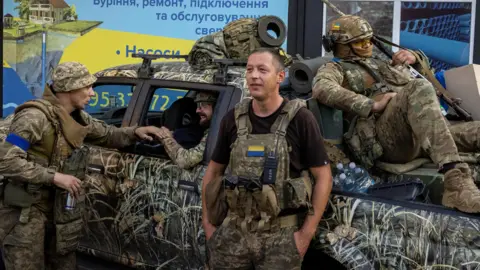 Reuters
Reuters
Russia has made sweeping advances in recent days that threaten to outweigh the gains made by Ukraine in its cross-border attack into the Kursk region.
Russian forces are just a few kilometres from the Ukrainian city of Pokrovsk, a crucial logistics hub used by the Ukrainian military.
Home to a key railway station and major roads, Pokrovsk is an essential supply and reinforcement point for Ukraine’s troops on the eastern front line.
Critics in Kyiv fear that the country's military has made a serious miscalculation.
By sending troops into Kursk instead of reinforcing the eastern frontline, the military has left Pokrovsk and other important Ukrainian towns exposed, these critics say.
Russian President Vladimir Putin launched a full-scale invasion of Ukraine in February 2022.
On a visit to the front line, Ukraine's armed forces chief Gen Oleksandr Syrskyi said Russia was throwing “everything that can move” into its assault.
“The situation is extremely difficult,” Ukrainian President Volodymyr Zelensky conceded on Wednesday.
“If we lose Pokrovsk,” military expert Mykhaylo Zhyrokhov warned, “the entire front line will crumble."
Why Pokrovsk matters

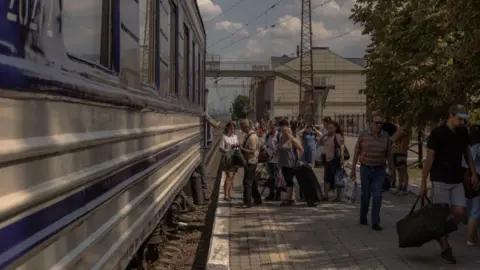 Getty Images
Getty Images
Pokrovsk is home to a key rail route used to supply the frontline. In recent days, it's been used to help evacuate civilians
Pokrovsk is next to another town, Myrnohrad. Together, the two settlements had a pre-war population of over 100,000, most of whom have now fled. They are the last major cities in that part of the Donetsk region that remain under Ukrainian control.
The battle for Pokrovsk is really a continuation of the battle for Avdiivka, which Ukraine lost in February after months of bloody fighting.
Avdiivka, which is about 40km (25 miles) south-east of Pokrovsk, was seen as a fortress that protected the settlements and roads to its west - helping to bolster Ukraine’s presence along the entire frontline.
When it finally fell, Avdiivka was left in ruins. It was a serious loss for Ukraine.
It meant that Russia could move its focus to Pokrovsk and the key hilltop town of Chasiv Yar, which overlooks some of the important cities in Donetsk still under Ukrainian control. Intense fighting there on Saturday left five people dead.

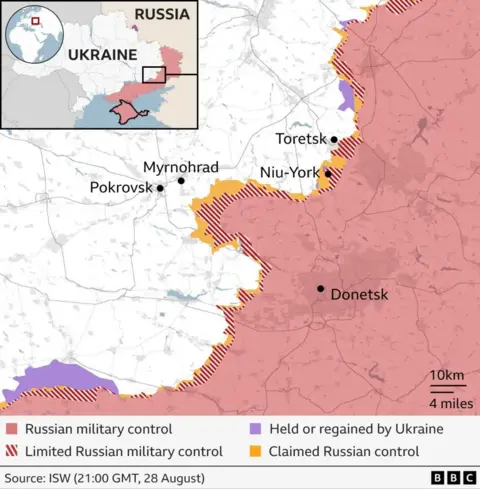
For weeks now a mass evacuation of Ukrainian civilians from Pokrovsk has been under way, with thousands said to have left already.
Gen Syrskyi said he was working “to strengthen the defence of our troops in the most difficult areas of the front, to provide the brigades with a sufficient amount of ammunition and other material and technical means”.
How Russia's advance gathered speed
Russia has long held Pokrovsk as one of its key objectives. For months its forces have slowly ground towards it.
Experts believe Moscow has deployed around one third of its Central Army Group, or about 30,000 troops, to the offensive - as well as its most battle-ready reserves.
This week, it took the Ukrainian town of Novohrodivka, infuriating some in Ukraine who felt it should have been better defended.
“The trenches in front of Novohrodivka were empty. There was practically no Ukrainian army in the once 20,000-strong city,” Ukrainian MP Mariana Bezuhla wrote on Facebook.
With its forces undermanned and outnumbered, it is believed the Ukrainian military withdrew from Novohrodivka to strengthen its defence of Pokrovsk.
"The Ukrainian command likely deemed the defence of Novohrodivka not worth the potential losses," said the Washington-based Institute for the Study of War (ISW).
Elsewhere, Russian forces have launched assaults on the town of Selidove, just south of Novohrodivka, and other areas of the Donetsk region nearby.
The Russian offensive has been helped by a shift in tactics, which are increasingly mirroring those used earlier in the war by the Wagner mercenary group.
Ukrainian forces report coming up against wave after wave of Russian infantry sent forwards in an attempt to storm their positions.
Some have dubbed these tactics "meat assaults".
The tactics - though costly - quickly exhaust Ukrainian units forced to fend off constant attacks.
Armoured vehicles are used sparingly - complicating the task of Ukrainian tanks and artillery, which have little to aim at on the battlefield.
Russia has also been using powerful glide bombs, forcing Ukraine to disperse its units when shelling begins and sometimes even withdraw troops from the front line.
The state of Ukraine’s Kursk offensive

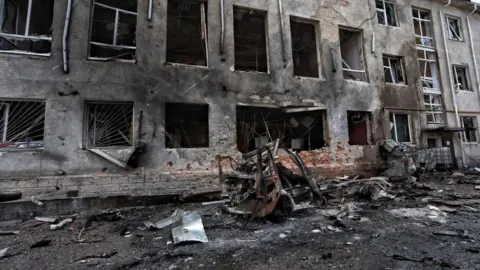 Getty Images
Getty Images
Ukraine currently controls the Russian town of Sudzha
Meanwhile, the progress of Ukraine’s landmark cross-border offensive has slowed considerably in the past week.
Sudzha - the largest settlement Ukraine has captured inside Russia - has a population of around 5,000, which is three times less than that of Novohrodivka, the settlement Russia captured earlier this week.
On Tuesday, Ukraine’s commander in chief said that Kyiv's forces had taken 1,294 sq km (500 sq miles) of territory inside Kursk, including 100 settlements - and captured 594 Russian soldiers in the process.
These figures should be treated with caution, but they are no doubt significant. The question is whether they will justify the potential losses on Ukraine's eastern frontline.
"One of the objectives of the offensive operation in the Kursk direction was to divert significant enemy forces from other directions, primarily from the Pokrovsk and Kurakhove directions,” Gen Syrskyi said on Tuesday.
But that objective appears to have failed. Russian forces have not been redeployed from the Pokrovsk frontline.
On the contrary they’ve been strengthened by additional troops and their advance has quickened.

 6 months ago
9
6 months ago
9


